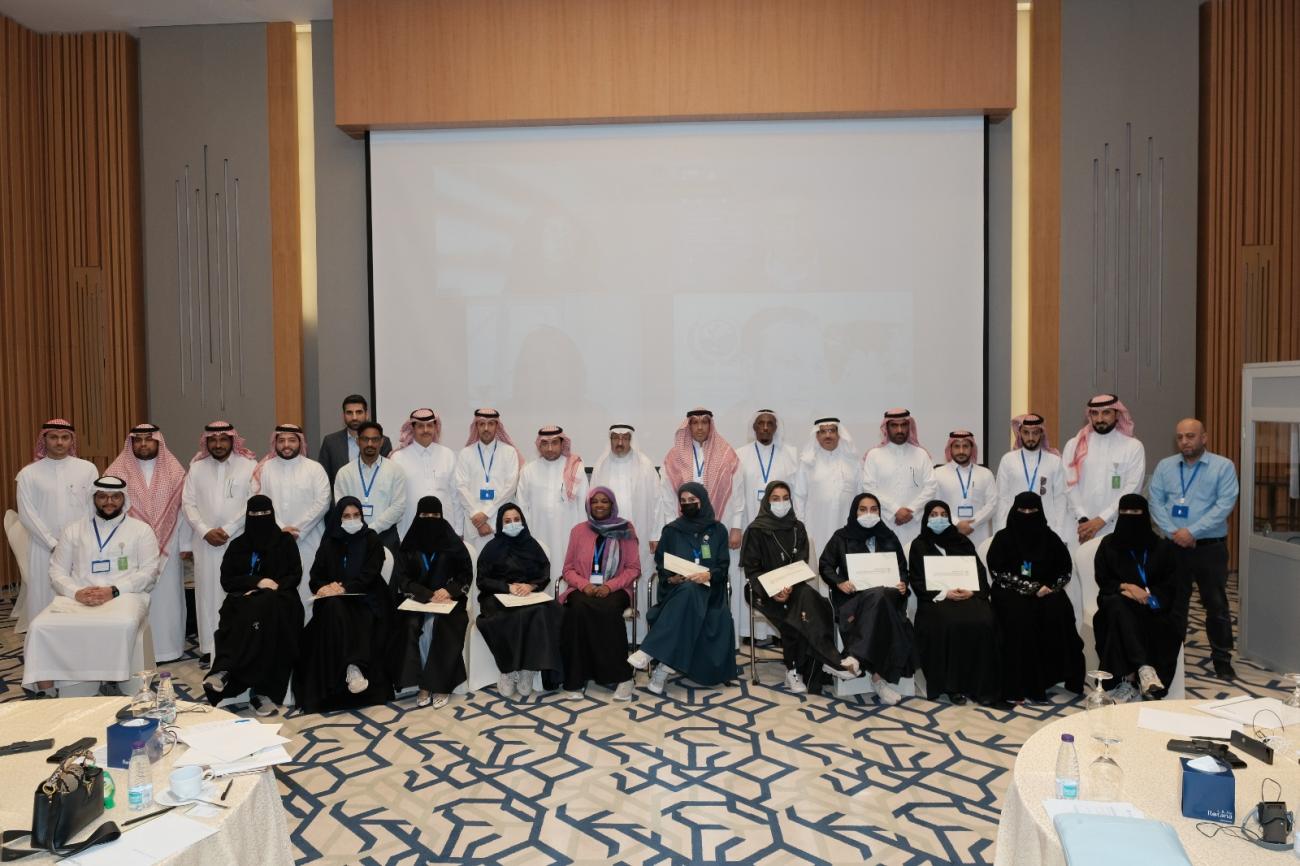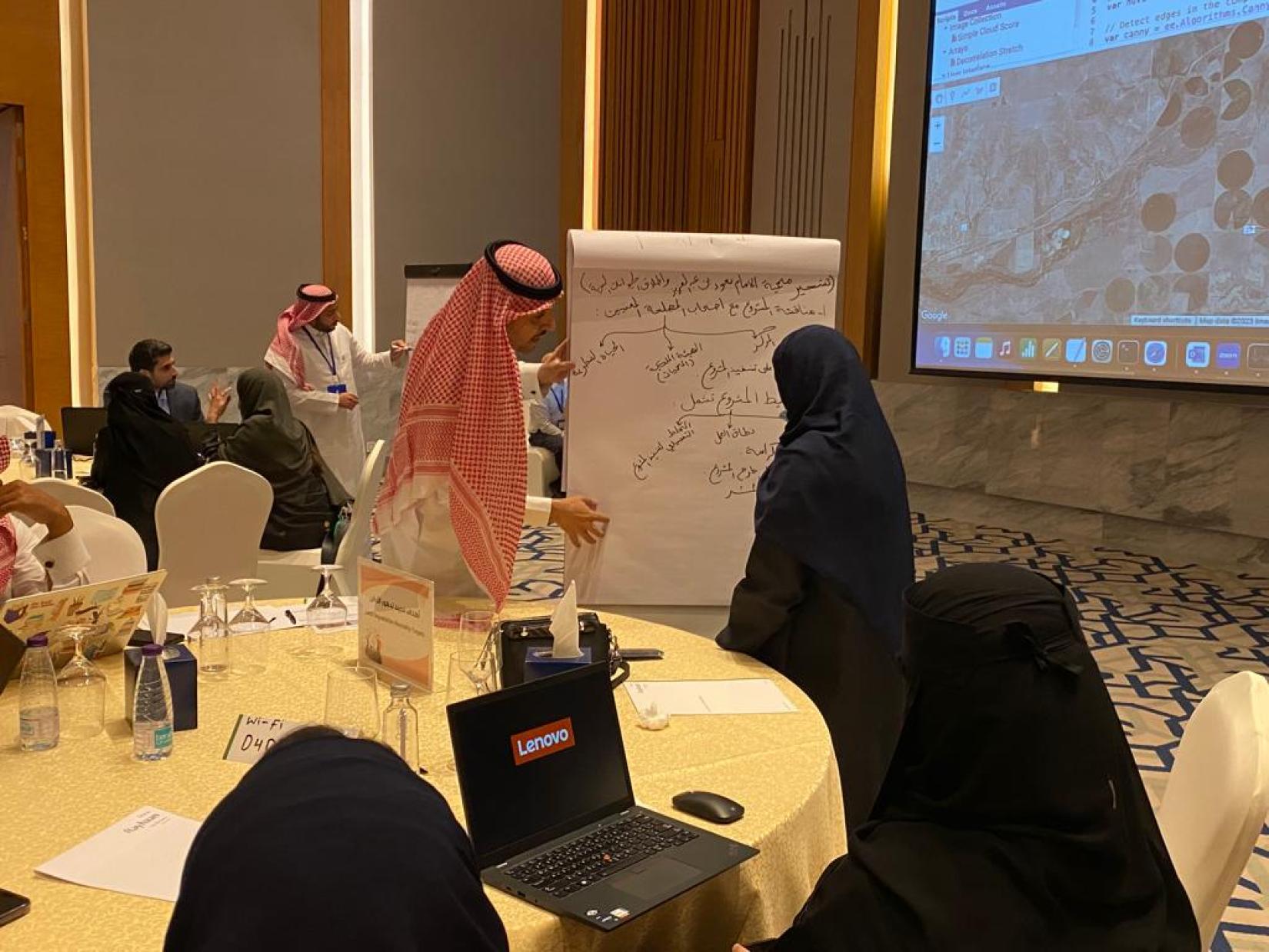Strengthening National Cadres in the UNCCD Field of Assessment, Monitoring and Reporting for Sustainable Land Management in Saudi Arabia

Training workshop strengthens NCVC and MEWA capacity for effective involvement in UNCCD
DAMMAM - The National Center for Vegetation Cover Development and Combating Desertification (NCVC) in collaboration with the Food and Agriculture Organization for the United Nations (FAO), the United Nations Convention to Combat Desertification (UNCCD) G20 Global Land Initiative (UNCCD-G20 GLI) and World Overview of Conservation Approaches and Technologies (WOCAT) jointly organized a training workshop on 19-21 March 2023 for the staff of NCVC and Ministry of Environment Water and Agriculture (MEWA) focused on strengthening their communication with the UNCCD in carrying out their tasks in the field of assessment, monitoring and reporting of desertification and land degradation for sustainable management of land in the Kingdom of Saudi Arabia.

Training workshop strengthens NCVC and MEWA capacity for effective involvement in UNCCD
Speaking on behalf of the NCVC Chief Executive officer at the opening ceremony of the training workshop held at Dana Rayhaan by Rotana Hotel in Dammam, Mr. Mishaal Althubaity, NCVC Director General of Shared Services highlighted the importance of strengthening the capacity of NCVC and MEWA staff for effective involvement in UNCCD and the related initiatives and entities in preparation for the Kingdom of Saudi Arabia to host of the UNCCD Sixteenth Conference of the Parties (COP 16) on 2-13 December 2024 and affirm the positive influence of its global participation. He observed that the training workshop enables NCVC to integrate combating desertification with resilience to climate change and conserving biodiversity for applying synergies of the RIO Conventions and equips the staff to actively work together in an integrated manner. Mishaal extended a warm welcome to all participants and the trainers who attended the training in person and virtually from the FAO Head Quarters Office and UNCCD offices globally and thanked FAO team and other collaborative partners for tireless effort working hand-in-hand for the success of the workshop.
Saudi Arabia's commitment to sustainable land management
Recalling the launch of the ambitious Saudi Green Initiative, the Director of the G20 Global Initiative of Land Degradation, UNCCD, Dr. Muralee Thummarukudy in his speech applauded Saudi Arabia’s unwavering commitment to addressing land issues as the Kingdom aims to plant 10 billion trees inside the country and rehabilitate about 40 million hectares of degraded lands, to enhance biodiversity, improve air quality and contribute to global carbon absorption efforts. He praised Saudi Arabia extended initiative beyond the border by leading some important roles through its noble initiatives such as the G20 Global Land Initiative and the Middle East Green Initiative as the Kingdom aspires to support the restoration of 200 million hectares of degraded lands in the Middle East and North Africa regions for mutual benefits at regional and global levels. Muralee emphasized that the year 2024 will mark a historical and momentous imprint for the Kingdom of Saudi Arabia not only for hosting the UNCCD Sixteenth Conference of the Parties (COP 16) but also to celebrate the occasion of the 30th anniversary of the founding of the UNCCD. He also expressed his pleasure for the strong cooperation with the NCVC and the FAO and observed that the training workshop will gear up the participants with the required knowledge and skills to implement good sustainable land management practices and learn about the UNCCD process in preparation for the UNCCD COP16.
Achieving SGI, MGI and SDGs Goals
FAO Saudi Arabia Programme Director, Mr. Ayman Omer, in his welcome remarks said, “The significant value of the topic covered by the workshop comes as a result of a strong commitment and fruitful partnership between the NCVC, FAO and the Coordination Office of UNCCD-G20-GLI”. He also pointed out that the training workshop would qualify, empower and develop the capabilities of the Saudi cadres in the NCVC and MEWA and geared them with the required knowledge and needed tools in monitoring desertification and prepare strong national reports for sustainable land management and also for the realization of the national and regional goals represented in the Saudi Green Initiative (SGI) and the Middle East Green Initiative (MGI). The training workshop would lead Saudi Arabia towards achieving the Sustainable Development Goals (SDGs), namely SDG 15: Life on Land and SDG 17: Partnership for Development. Ayman concluded his speech by wishing all the success to the participants and extended his gratitude to the organizer for the good preparation and organization of the workshop.
Collaboration with UNCCD and WOCAT
Five experts from UNCCD contributed during the 3 days of the training workshop and their presentation covered generic information on UNCCD, an overview of the Committee for the Review of the Implementation of the Convention (CRIC) and CRIC 21 in particular. The experts also unveiled input on how Saudi Arabia will contribute and unfold some possible technical challenges in reporting SDG indicator 15.3.1 in the Kingdom, and other general organizational matters of UNCCD COP including the themes of UNCCD COP16. Two WOCAT experts led the participants to explore the WOCAT database, Sustainable Land Management (SLM) approaches and technologies as well as mapping of land degradation using an interactive approach. An extensive discussion took place at the training workshop as the presentations draw participants' interest to understand better how Saudi Arabia will get involved.
Saudi gains essential knowledge and readiness
The training workshop on 19-21 March concluded successfully with full coverage of topics planned – among them - Saudi Arabia dimensions of land degradation and desertification, drivers of desertification and land degradation, and land monitoring using remote sensing and geoinformatics. Individual tutorials and practical sessions were organized where participants had an opportunity to reflect on and apply what they had learnt. Throughout the training, Saudi female participants showed strong participation in the workshop. Electronic quizzes were conducted at the beginning and end of the training workshop proving that participants gained desired knowledge. A dialogue session on how the NCVC can benefit from Saudi Arabia's hosting of the UNCCD COP16 was conducted on the last day. The skills and knowledge gained will be instrumental in preparing for the upcoming task on the assessment of the state of desertification in Saudi Arabia for the fourth cycle of PRAIS4 (Performance Review and Assessment of Implementation System).





